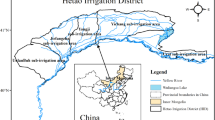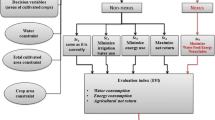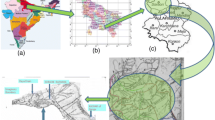Abstract
Conventionally, irrigation development planning has been based on cropping pattern selection aiming at maximizing the revenue from irrigation activities. In the real world however, several complexities make the cropping pattern selection a more complicated mathematical problem. Of great interest is the case of water supply from multiple sources (e.g. surface and groundwater) in which a multi-criteria approach is most appropriate. Goal programming has been used in the past to solve cropping pattern selection problems, with criteria of a similar nature, the net benefit being included as a constraint. This paper presents a methodology, based on the fuzzy set theory, for enhancing the goal programming approach to solve similar problems under various sets of criteria of a different nature. In the proposed methodology the net benefit maximization is considered together with all other criteria. The methodology is illustrated using data from the Thessaly Plain in Greece.
Similar content being viewed by others
References
Carvallo H., Holzapfel E., Lopez M. & Marino M. 1998. Irrigated cropping optimization. Journal of Irrigation and Drainage Engineering 124: 67–72.
Charnes A. & Cooper W. 1977. Goal programming and multiple objective function. European Journal of Operational Research 1: 39–54.
Dooremdos J. & Kassam A.S. 1979. Yield response to water. FAO Irrigation and Drainage Paper, No. 33, Rome.
Kindler J. & Tyszewski S. 1995. On the value of fuzzy concepts in hydrology and water resources management. In Z. Kundzewicz (Ed) New Uncertainty Concepts in Hydrology and Water Resources, Cambridge University Press, pp. 126–132.
Klir G. & Yuan B.T. 1995. Fuzzy Sets and Fuzzy Logic Theory and its Applications. Prentice Hall.
Li L. & Lai K.K. 2000. A fuzzy approach to the multiobjective transportation problem. Computer and Operation Research 27: 43–57.
Chang N. B., Wen C.G. & Chen Y.L. 1997. A fuzzy multi-objective programming approach for optimal management of the reservoir watershed. European Journal of Operational Research 99: 289–302.
Mohammadi E.M. 1998. Irrigation planning integrated approach. Journal of Water Resources Planning and Management 124: 272–279.
Papadopoulos B. & Sirpi M. 1999. Similarities in fuzzy regression models. Journal of Optimization Theory and Applications 102(2): 373–383.
Tsakiris G. 1985. Evaluating the effect of non-uniform and deficient irrigation. Part 1. Advances in Water Resources 8: 77–81.
Tsakiris G. & Kiountouzis E. 1984. Optimizing the interbasin water transfer for irrigation development. In G. Tsakiris (Ed) Proceeding of the Fifth International Conference on Water Resources Planning and Management ‘Water in the Year 2000’, pp. 4.13–4.24.
Tsakiris G. & Spiliotis M. 2002. A methodology for solving water resources management problems using fuzzy linear programming. Research Monography, Laboratory of Reclamation Works and Water Resources Management, NTUA, pp. 1–24 (in Greek).
Tsakiris G. & Spiliotis M. 2002. Water allocation based on fuzzy objective function and fuzzy constraints. In G. Tsakiris (Ed) Proceedings of the Fifth International Conference of EWRA, ‘Water Resources Management in the Era of Transition’, pp. 252–267.
Vedula S. & Kumar N. 1996. An integrated model for optimal reservoir operation for irrigation of multiple crops. Water Resources Research 34: 1101–1108.
Jairaj P.G. & Vedula S. 2000. Multireservoir system optimization using fuzzy mathematical programming. Water Resources Management 14: 457–472.
Zimmermann H.J. 1984. Fuzzy Set Theory and Decision Analysis. Elsevier, Amsterdam.
Zimmermann H.J. 1991. Fuzzy Set Theory and its Applications. Kluwer Academic Publishers.
Author information
Authors and Affiliations
Corresponding author
Rights and permissions
About this article
Cite this article
Tsakiris, G., Spiliotis, M. Cropping pattern planning under water supply from multiple sources. Irrig Drainage Syst 20, 57–68 (2006). https://doi.org/10.1007/s10795-006-5426-y
Issue Date:
DOI: https://doi.org/10.1007/s10795-006-5426-y




